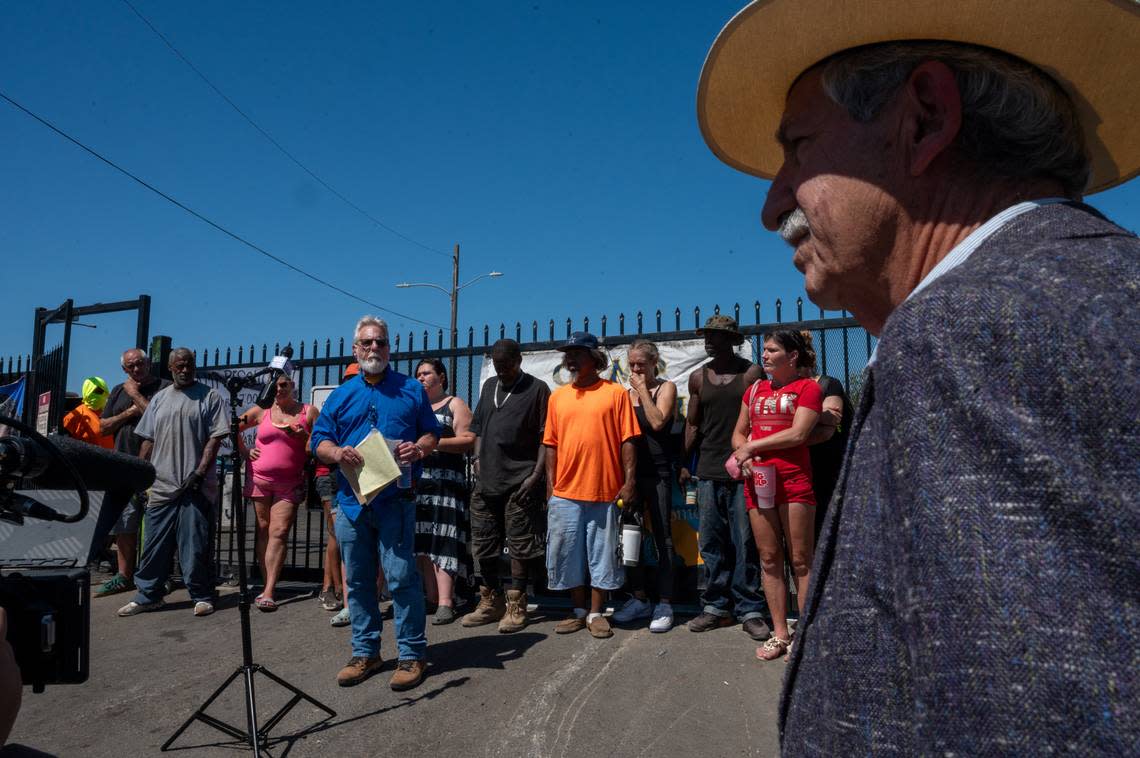Tight-knit homeless camp in Sacramento is losing its lease. What happens to the residents?

The future of a tight-knit North Sacramento homeless camp has been uncertain for months, and just got more uncertain.
Nonprofit Safe Ground Sacramento sent a letter to the city Tuesday, obtained by The Sacramento Bee, stating it is ending the Camp Resolution lease Aug. 10.
It appears it will now be solely up to the city to decide whether to shut the camp down and evict the roughly 50 residents. City spokesman Tim Swanson did not immediately respond to an email seeking comment.
Mark Merin, chairman of Safe Ground Sacramento, stated in the letter that the nonprofit holds legal responsibility for the lease but “the residents, in the self-governing encampment, have chosen to be represented by the Sacramento Homeless Union in their relations with the City.”
The letter outlines several issues with the camp, at Colfax Street and Arden Way, that have caused the nonprofit leaders to determine they must end their involvement as the lessee.
“The site needs a water supply and electricity which cannot be supplied without some substantial city financial support, which we have been advised the city cannot provide,” the letter stated. “The excessive heat and anticipated inclement weather makes injury more likely in the absence of water and electricity supplies.”
During a record-breaking heat wave earlier this month, a man died of heat stroke in a trailer in a private trailer park that lacked air conditioning. The Camp Resolution trailers also lack air conditioning.
Mayor Darrell Steinberg last week announced the city would deliver water bottles to the camp, after the county stopped delivery to 34 camps July 1 but the site still does not have running water.
The removal of Merin’s nonprofit now means the fight will be squarely between the Sacramento Homeless Union and the city. The homeless union in May sued the city for previously threatening to close the camp.
The homeless union last week blocked city employees from entering the camp to do an inspection and sign up residents for affordable housing waitlists.
“We are OK with an inspection — with notice and an opportunity and an obligation on their part to sit down with what is supposed to be a self-governed camp and talk about the issue,” Sacramento Homeless Union attorney Anthony Prince said during a news conference last week.
Prince said that 16 residents have gotten housing since the camp opened, without city help.
Crystal Sanchez of the Sacramento Homeless Union said she wants the camp to stay open permanently as a place where people can transition off the streets into permanent housing.
Sacramento City Councilwoman Katie Valenzuela said although she’s always supported the camp, she does not want the city to keep the camp open permanently.
“The goal was always to get residents on site housed, which was still our goal at our meeting with residents at the beginning of this month — not to turn it into a permanent intake site for folks,” Valenzuela said. “We’d prefer to develop the site into housing once we get the folks on site safely settled.”
She defended the city and criticized the homeless union.
“I’ve been witness to the city’s efforts over the last several weeks to address outstanding concerns at Camp Resolution, including our attempts to access the site to do assessments for housing and to conduct the health and safety inspections required by the lease,” Valenzuela said. “Our efforts have been completely hampered by representatives of the Sacramento Homeless Union, who chose to use threats and intimidation against us and residents of the camp to prevent dialogue.”
Since 2022, the city has allowed roughly 50 residents of Camp Resolution in North Sacramento to live on a city lot and gave them trailers to live in. Camp Resolution is unique because it’s self-governed, and the city does not have to pay millions to contractors for operations. The sense of community and safety is desirable to unhoused people, and over 800 signed up for the waitlist.
The idea was to prove the concept, then duplicate it around the city. Since it does not cost millions a year like other city shelters, it works for the city’s looming deficit, but still gives people basic human needs such as water, bathrooms, food and security.
But when some people were camping in tents on the dirt, which is against the lease for environmental reasons, the city announced plans to close the site, then delayed those plans amid backlash. District Attorney Thien Ho has threaten to sue the city, as he has in the past.
Steinberg earlier this year promised the city would offer all residents an indoor shelter bed before clearing them off the site.

